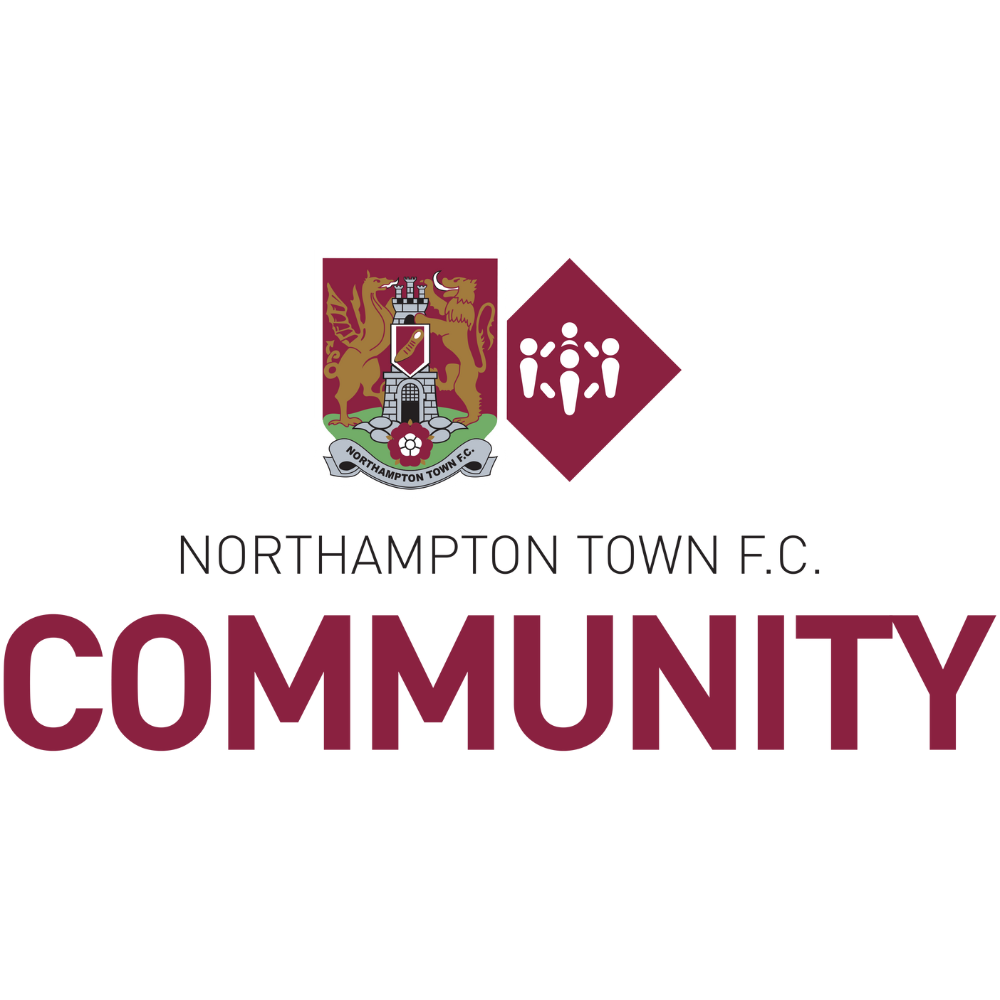EFDN Interview- Karin Heri from Malmö FF
This interview features Karin Heri. Karin is the Head of Sustainability at Malmö FF and responsible for MFF in the community. We asked Karin Heri several questions about their commitment to the Sustainable Development Goals (SDGs), the communication of the SDGs, recommendations for other football organisations and why Malmö FF is #Morethanfootball.
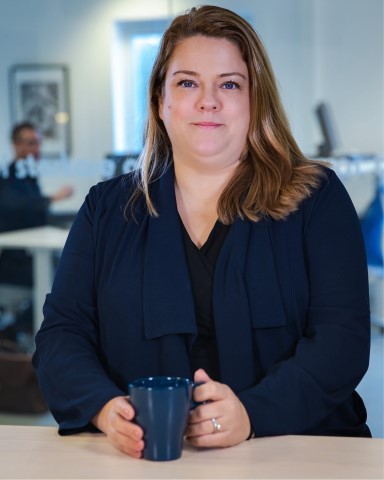
EFDN: What is a typical day in your role like?
I have to say that there is no typical day- although that sounds like a cliche. It’s a very social job and I interact with a lot of people every day. In addition to being sustainability manager I am responsible for MFF in the community, which is an umbrella organisation for the youth and community programmes. I meet with people on the low but also high level, for example, politicians, executives, others NGOs, civil right organisations. I am involved in a lot of networking with organisations in Sweden and on an international level. A lot of people are reaching out and are asking questions about our work.
I participate in various types of steering committees focusing on impact measurement, partnerships among all three sectors, employability and so on. I have a team of great employees that is responsible for the implementation of what we are doing. In general, the work is very social and outgoing.
EFDN: What do you love the most about working for the club/foundation?
When you are good at networking and show that you have a passion for the topics, it leads to new opportunities not only for your club but also for other organisations. I believe in giving and not just taking. I think that is a lesson that I learned to be generous and supportive.
Our football season is over and should start in April again. There are a lot of negotiations with sponsors going on. The main topic they want to talk about is sustainability and CSR.
EFDN: What are the main objectives of your club/foundation?
CSR has always been important for the club. Where we have developed the most initiatives is the social field, including education, employability, anti racism. We have teamed up with the organisation Stadsmission that works with homelss and different target groups living in poverty in Malmö and the region of Skåne.
We are one of just three clubs in Sweden that are owning their stadium. This is a fantastic opportunity to work on sustainability, in terms of sustainable energy, (food) waste and travel to the stadium. Sustainability is an area where I tried to push people internally. We have now a great new colleague in the facility manager who understands that it is a great way to save money, of course, but also a good way to develop your brand, give back and take responsibilities. Malmö FF is unique as there is no other organisation that is gathering 18.000 people 15 times a year in this region. I think that environmental sustainability should be our main focus in the future. But we will of course continue with all the other initiatives that we are already implementing.
EFDN: Why did you decide to use the Sustainable Development Goals (SDGs) as the framework for your projects?
I have been interested in the SDGs already for a longer time. But as you know, it’s never a one-man or one-woman show. I can’t do everything myself and you need a team to work successfully and efficiently in the long term. So I was looking for a way how to explain the SDGs to our employees, answering the questions “Why and how we do it”.
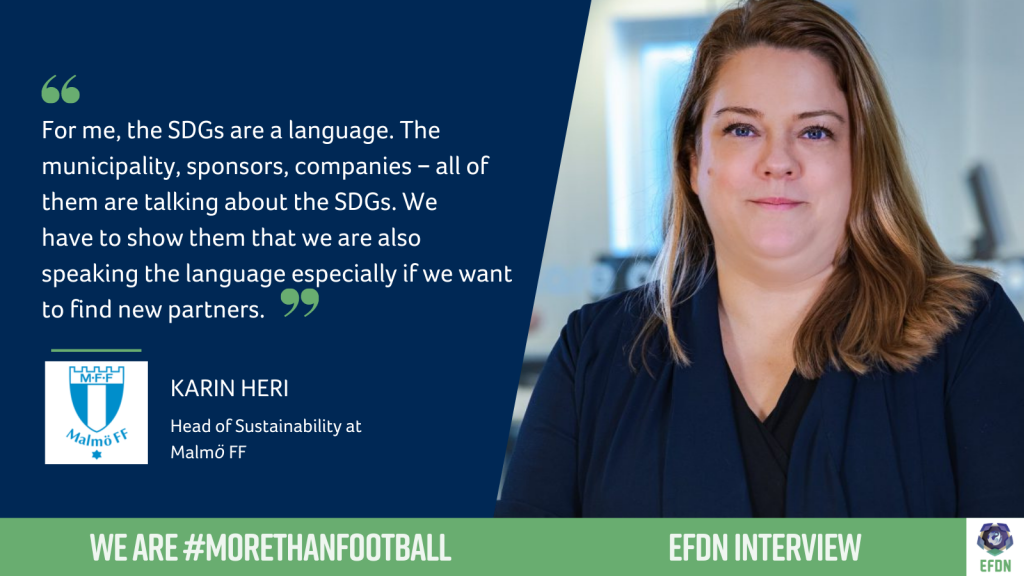
For me, the SDGs are a language. The municipality, sponsors, companies – all of them are talking about the SDGs. We have to show them that we are also speaking the language especially if we want to find new partners. I see a lot of other clubs and organisations throwing the logos on the website and that’s it. That’s not the way we do it here at Malmö FF.
EFDN: To which SDGs do you contribute and how did you communicate it internally?
I have discussed the topic with many people. I have contacted our partner for PR and communications and a colleague called Martin there is an expert on the communication of the SDGs. For one year, I worked on a process together with the consultant. Starting with raising awareness and spreading knowledge about the SDGs. When you start at the global level the SDGs are hard to understand. We had to break it down. We know that we alone can’t save the world but we already do something. It’s easier to start with the ongoing projects and see their potential.
We have initiated a very creative process on different levels of the organisation. The board would have liked to see how we can contribute to all 17 goals but we ended up choosing a couple of goals as a canvas for the next years. We have translated the original text about the goals and wrote our own Malmö FF versions. That helped people to understand.
It was important for me, that I took a step back and let the colleagues be the active part in the process. Usually, I am always many steps ahead as I am in charge of the planning and strategy. During this development process, some people got really enthusiastic and I could give them credibility and lift them when they discovered connections of their work to the SDGs. I for myself hoped that we would choose goal 17 (partnerships for the goals) as our main goal because we implement all projects together with sponsors, spectators, schools and partners. One of my colleagues came on his own to the same conclusion and said: ‘We should pick goal 17. We do everything together with others.’ I wanted to hug him.
Besides goal 17, we have chosen the goals 4 (quality education), 8 (decent work and economic growth) and 12 (responsible consumption). We have decided to create our own SDG, healthy food, which is linked to SDG 12. To eat healthily is important for school results, athletes and a healthy lifestyle in general.
We are just at the beginning of the journey but it was really important to include the board in the process. I have presented the results of the internal process to the board in May. They really got it because they work in enterprises that work with the SDGs. One of the questions that I received was why we did not pick equality or other things. I said: If we choose too many, it might be difficult for us to give the same effort to all of them. For two years, we focus on the mentioned goals but it does not mean that equality is not important for us. We will just not communicate it so publicly. After two years we will hand in suggestions for more goals. We will see, it is a long term process.
What I am a bit frustrated about is that organisations often hesitate to communicate their contribution without having all the data and impact. For example, when it comes to sustainability some people might criticise us. Of course, we are not perfect and our team is still flying sometimes because we think then that is the best decision for our organisation. But when we are looking at the existing data, we see that our first team is the one that travels the most kilometers by train. In 2019, if you count together all the people that went by train, we traveled over 750 000 kilometers by train! And the players really like it to travel by train. So I am in contact with the Swedish railway organisation and I will push that we communicate this.
EFDN: Do you have any advice for our football organisations on how to communicate your commitment to the SDGs towards other stakeholders? You have mentioned the negotiations with sponsors and partners before.
In October we gathered 65 people from companies that are in the higher segment of the sponsors for our annual trip. I held there a motivational speech about SDGs. I mentioned that this year was a catastrophe but that it also provided us with a fantastic opportunity. Because normally we get asked, why we don’t you talk more about your initiatives. But we are communicating. It’s just difficult when there are five news about MFF community and 200 about the football matches. When there was suddenly no football, all the attention turned towards our apartment and the questions we deal with every day. Then I felt so secure and confident that I could answer questions from other organisations that struggled to connect their activities with ours. I offered them that we could launch something together maybe with a focus on employability or health.
Sometimes we had problems getting sponsors to understand what we are doing. But once we have used this universal language, they get it. They get that we are in the same bubble but just have different perspectives. To communicate with sponsors it is most often better to talk to them directly instead of using handouts and newsletters., talk to them. I meet, for example, a lot of commercial people. They sometimes don’t have the understanding so I am asking them who is responsible for sustainability in their organisation. If you pass the commercial people and move toward the sustainability manager, there is also new money. Sustainability is a different budget post than marketing. That’s a hint.
I have just finished writing an article in our yearbook that we hand out to all members. I wrote two pages about the SDGs. We are also working on a way how we can visually put it up to the homepage. I think we have to do hands-on stuff to make people understand it.
We, as the management team decided when we did our evaluation of 2020 that we force people to connect their goals to the selected SDGs. For some of them, it was difficult because they have “hard” targets only connected to numbers. We have talked a lot about a mind shift resulting in for example highlighting that the rise of electronic tickets is linked to the SDG 12, responsible consumption. We have had many of these aha moments. People have to think differently realising that, for example, saving money is one parameter and the reduce waste and consumption is the other. This is motivating them to be creative. We have also a graphic that shows the decision process within the organisation and we have added sustainability on the side. One of the most difficult questions from now on is: ‘When do we say no to sponsors because of our sustainability strategy?’
EFDN: How do you handle this at Malmö FF?
We are discussing this in the management team. We got an offer from a company involved in high-risk investment. My gut feeling was not good and after discussing it with our B2B manager and my network, we turned them down. It’s sometimes hard, we have already turned down other offers, for example, if we saw too many political connections or shady businesses. In general, it’s important that the CEO is involved in the whole process.
EFDN: What challenges did you face during the pandemic and how did you/ plan to overcome them?
One of the challenges that we saw was food poverty. Malmö is a very segregated city. A city full of opportunities but also with problems. Food poverty is growing, which is crazy in one of the richest countries in the world. Skåne Stadsmission, our partner organisation, has normally a lot of volunteers over 70. The demand was higher than usual but a lot of the staff and volunteers were afraid to come due to the pandemic. We saw that some of our staff did not have enough tasks for a full working day. Therefore, we encouraged them to give some of their paid time to Stadsmissionen and help to pack and deliver food. That was important also internally as people felt that they can help.
Our partner organisation saw that they can get help from us when it comes to a big issue. This was also the start of our new collaboration in the upcoming two years as we saw that we can support each other to help the target groups. One example: We have installed a container next to the stadium where people can donate clothes. Some of these will be donated and others will be sold to raise money. If they can’t be sold they will be brought to waste plant where they recycle them and sell the fabric. This is a sustainable collaboration on a social and environmental level. They also work with the SDGs and we plan food waste projects together etc. We had a different perspective but its – again – a common language.
I am not interested in satellite stuff, short term and communicating something very much. I like to do something long term and communicating it continuously. I was afraid that our cooperation would appear as greenwashing. At the moment we don’t have any food waste as there are no spectators but we are in talks with them how we can arrange that we can bring our food to their food banks and social supermarket. This collaboration is something that I am proud of, especially also because it made an impact internally and our staff saw that they can make a difference.
EFDN: We believe that Football is #Morethanfootball. Why do you think your foundation is #morethanfootball?
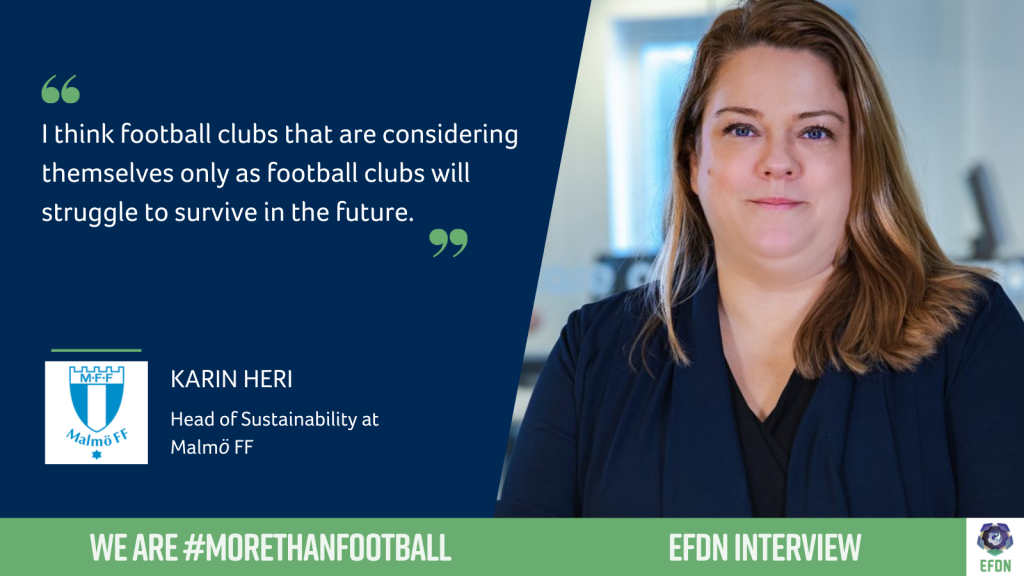
Malmö is a city but it also a football team. Not everyone is a fan of Malmö FF but everyone knows the club. We have the opportunity to make an impact, so we should. Football is networking and education, joy and sorrow. We get so much from our spectators, sponsors, partners, the municipality and if you have the chance to give back and make an impact, you should. That is your responsibility if you are a strong brand. And Malmö FF is the strongest sports brand in the region, maybe even in Sweden. I think football clubs that are considering themselves only as football clubs will struggle to survive in the future.
EFDN: To whom would you like to #passiton too, and why?
I would like to pass it on to Beatrice Clarke from the Swedish league to get a league perspective and to Charly Bennett from Hibernian, as I had very interesting conversations about employability and sustainability with him.
If you want to know more about Karin Heri and her work at Malmö FF, you can visit her LinkedIn profile.
Malmö FF is participating in our GREENFOOT programme. Read more here.
Did you see the SDG section on our website. We are presenting some ideas how Sport can contribute to the 17 SDGs here.
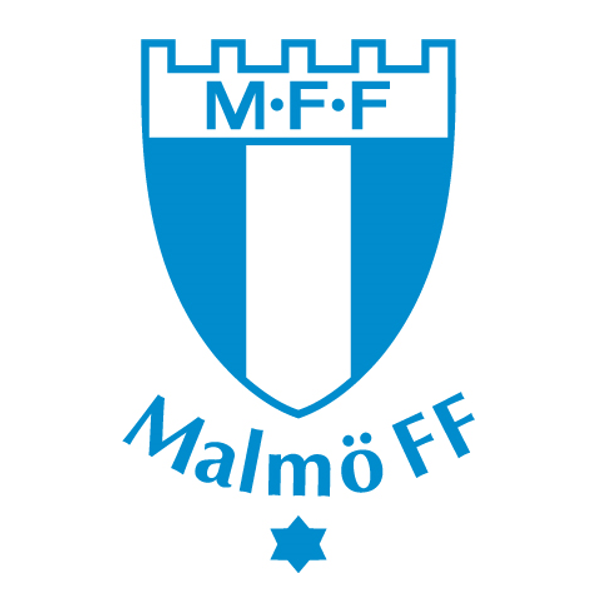
Malmö FF – Football network
Malmö FF – Career Academy
